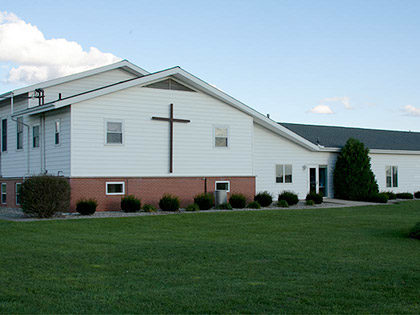Matthew 20:20-28
Introduction:
Quote from Dietrich Bonhoeffer:
[The cross is laid on every Christian. The first Christ-suffering which every man must experience is the call to abandon the attachments of this world. It is that dying of the old man which is the result of his encounter with Christ. As we embark upon discipleship we surrender ourselves to Christ in union with his death—we give over our lives to death. Thus it begins; the cross is not the terrible end to an otherwise god-fearing and happy life, but it meets us at the beginning of our communion with Christ. When Christ calls a man, he bids him come and die. It may be a death like that of the first disciples who had to leave home and work to follow him, or it may be a death like Luther’s, who had to leave the monastery and go out into the world. But it is the same death every time—death in Jesus Christ, the death of the old man at his call.] (The Cost of Discipleship, 99)
This message is powerful, but can be obscure to some. When he speaks of death, he is not speaking of the literal and physical act of dying. He is speaking of choosing to not fulfill our selfish desires, and instead fulfill the desires of Christ. The literal reality is that you, by the power of God’s Holy Spirit, deny your selfish desires and live out Christ’s desires instead.
This death has been fulfilled literally by many Christians through the ages and is being fulfilled in increasing numbers in recent years. Just as referenced at the beginning of sermon. But whether the call comes to actually physically die, or die in the sense of giving up one’s own desires to serve Christ, the call is the same.
Theme:
This was not something realized by the first Christians and is not something realized often by Christians today. And a lot of preaching tends to de-emphasize this fact. Many preachers want to present Christianity as an easy thing, desiring to see more people come to Christ as a result.
There is great joy in being a Christian. There is peace, love, and hope. But there is also a lot of denying yourself of your desires in favor of fulfilling the desires of another, namely Christ. And that is not always easy. Last week we spoke of the need to help others in need and to share Jesus with other people. These things are not usually easy and don’t fit
The first Christians were like many Christians – they didn’t quite realize what they were getting themselves into. They had thoughts of luxury, comfort, honor, recognition, prestige, people serving them. They had thoughts of the easy and good life.
In our text today, we see Jesus correcting this misconception about what it means to be a disciple of Christ. Two brothers and their mother come up to Jesus desiring that He would grant privilege, honor, comfort, and prestige. His reply, if it were understood, must have shocked them. Being a disciple of Christ meant exactly the opposite of what they thought.
Text: Matthew 20:20-28
Verses 20-21 – A Bold Request
The sons of Zebedee are better known to us as James and John. She comes to Jesus humbly and asks Jesus for a bold request. But what is not immediately evident in the text, particularly in the English version, is that probably James and John have put their mother up to this.
I say that because in verse 22 Jesus uses the plural you. He says “You all do not know what you all are asking. Are you all able to drink the cup that I am to drink?”
So it’s their mother that comes up to Jesus and asks this question, but Jesus directs his response to James and John and tells them that they don’t know what they are asking.
The mother is asking the question, but she is functioning as the go-between. Maybe James and John thought Jesus would have a more tender heart toward their mother than He would toward them, or that the request would appear less selfish if it came from her instead of them.
It always is pretty moving when a mother asks for something on behalf of her sons, and they are likely trying to use that to get what they want.
And what they want is pretty bold. They believe that Jesus is the promised Messiah and that Jesus will establish the promised Messianic kingdom. They want to be his right and left hand men.
What a request! It’s no wonder they are getting their mother to put it to Jesus. That’s quite the honor to ask for yourself.
Link: But, well, Jesus, as always, sees right through the question and lets them know: they don’t really understand what they are asking for.
Verses 22-24 – A Sobering Promise
We have the power of hindsight so we know what Jesus is really saying here. Those who originally heard him evidently did not. They heard “drink the cup I am to drink” in a positive light, because they did not yet fully understand where Jesus’ earthly ministry was ultimately leading to. Although Jesus had told them several times that He would die, they did not really believe it, but thought instead that all these miracles and teachings were ultimately leading toward Jesus being crowned king of the Jews, overthrowing the Romans, and setting up a Jewish kingdom.
The other disciples are upset to hear that these two would have the honor to drink the same cup that Jesus drinks from because in their thinking it meant ease and comfort.
If James and John had really known what that meant, I’m pretty sure they would have never asked the question. They think being Jesus’ right and left hand men means honor, privilege, luxury, being at ease. They think that being first means being the one who is served and treated the best.
But Jesus didn’t come to be served and treated the best. The cup that He is referring to is not a cup of luxury. It is a cup of service, pain, and sacrifice.
Jesus essentially promises that the service, pain, and sacrifice part will be fulfilled in their lives, but says that – as for the positions of honor – that is not for him to determine.
They get to suffer. And maybe if it is the Father’s will they will get those desired positions. Ouch. It’s evident by the other disciples’ reactions to this that they simply did not understand. If they had, they would not have been indignant, they would have been fearful.
Link: Jesus corrects their misunderstanding in the following verses.
Verses 24-28 – A Misunderstanding Corrected
Verse 25 is where the disciples are coming from in their understanding, basically. Their knowledge and experience of rulers is that they lord over their subject and have authority over their subjects.
“I’m up here and you’re down here.” Rulers collect taxes, live in palaces, eat and drink well, have subjects fawning over them for attention and favors and decide much. They get coins made with their pictures on them and parades in their honor. This is the kind of leadership the world is used to, the world desires, and the world promotes. A type of pyramid structure with the powerful on top and the others below supporting them.
Jesus says “it shall not be so among you.” This is not how it is to be in Jesus’ church. In fact, it will be the exact opposite of the kind of leadership that they are used to. He takes the world’s social structure and flips it on its head.
Jesus’ leadership will not be one of comfort, ease, privilege, and lording over ones subjects. Those who would lead according to Christ’s example must be servants and slaves. Jesus demonstrates this throughout the Gospels in many ways, most noticeably in John 13 when he washes his disciples’ feet, and especially by His ultimate sacrifice on the cross.
Slavery during biblical times was not the same as what we think of today when we think of slavery, but it was and never has been something with lots of rights, privilege and comfort.
The Bible doesn’t say what their reaction to these comments was, but if they had been listening carefully, Jesus just told them what it means to drink the cup that Jesus drinks, because He says at the end “the Son of Man came not to be served but to serve, and to give his life as a ransom for many.”
It probably didn’t register. Most things didn’t register with people until after Jesus rose from the dead. For a variety of reasons, when Jesus was talking to the disciples before the resurrection, it was like talking to brick walls. It just didn’t go through most of the time.
Application:
But here we are on the other side of history, on the other side of the resurrection, and so we know what this means.
This means that the life of a follower of Christ is a life of service and one that can often be difficult and painful. For some, it can even mean a life cut short for the sake of the Gospel. It is a life lived not in pursuit of one’s own comfort, ease, and glory, but lived to help and benefit others.
Both James and John lived lives of service and both of them at times suffered for their faith. James was the first apostle to be martyred. John was the last apostle to die. He probably died a natural death, but he too suffered due to imprisonments and exile.
They both drank from Jesus’ cup. What kind of position they will have in the kingdom we will have to wait and see. Certainly higher than my own I’m sure!
Living according to this calling is hard for a variety of reasons, but especially because it takes great faith. It calls upon us to give up a lot of comfort, pleasure, and ease. And what’s more, we don’t do this in the hope that someday we will have a bunch of personal servants attending to us in heaven. In heaven, we will be serving and worshipping God. Of course, there will be rewards, there will be pleasure, but God’s way is, has never been, and never will be for us to try to make other people our servants.
It’s the ultimate delayed gratification. It’s denial of gratification, period. It’s saying, my life will not be about my own gratification, period.
And in a remarkable paradox, herein is a higher gratification achieved. As we seek to know Christ and obey Him more, we begin to develop the fruits of the Spirit in our lives – joy, love, peace, patience, gentleness.
Application:
- There are needs and opportunities for servants within the church: teachers or substitute teachers – Jane’s class and Jeremy’s class; kid’s club helpers – particularly this coming Wednesday; work crew
- There are needs and opportunities for servants outside of the church.

